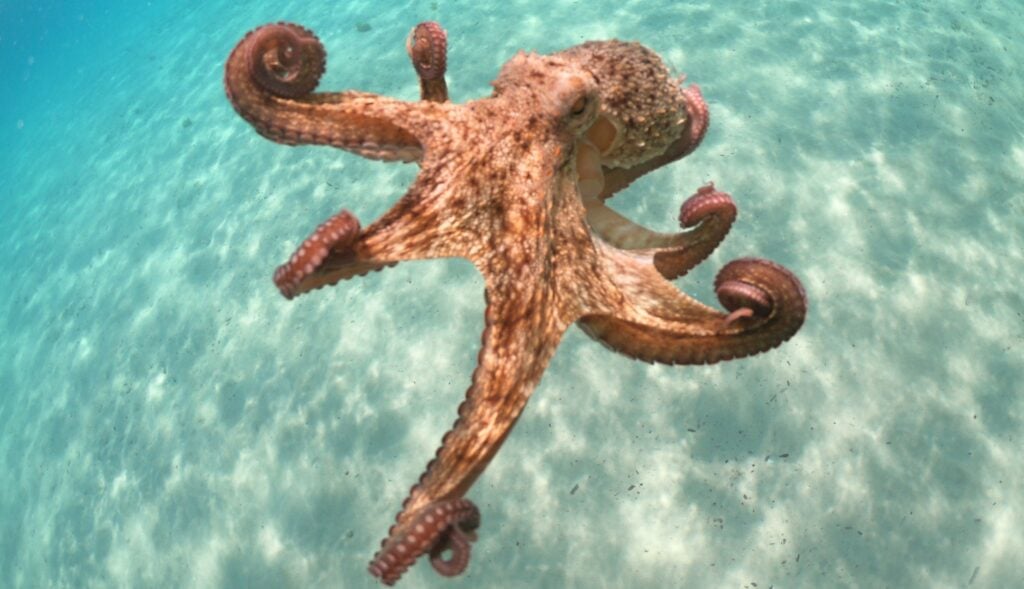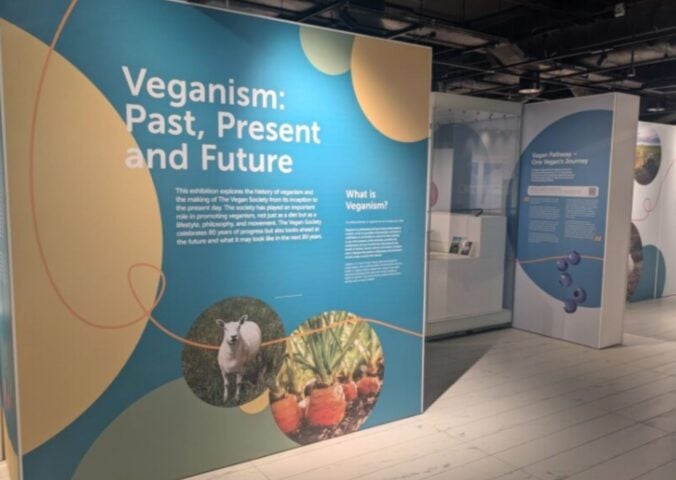Animal rights activists around the globe recently took part in coordinated protests outside Spanish Embassy buildings, aquariums, and restaurants selling octopus meat.
On October 8 (World Octopus Day), protestors aimed to urge the Spanish government to put a stop to multinational seafood manufacturer Nueva Pescanova opening the world’s first octopus farm in Gran Canaria next year.
Representatives from the Plant Based Treaty, In Defense of Animals, and Ocean Born Foundation were all in attendance. Scientists and celebrities, including vegan actor Paul Wesley, bolstered protest numbers both in person and virtually.
“Octopuses are one of the most fascinatingly beautiful creatures on Earth. They are wildly intelligent, sentient beings capable of high-level cognitive behaviors,” Wesley said in a statement.
“The idea of creating an ‘octopus farm’ where they will be tortured their entire lives and killed for the sake of mass profit is beyond devastating and mind-boggling. We must stop the company Nueva Pescanova from committing this horrific moral atrocity.”
Barcelona, Mumbai, Tel Aviv, and Gran Canaria were among more than 20 locations to feature demonstrations.
Plans for the octopus farm
It is anticipated that Nueva Pescanova will create an aquaculture facility akin to livestock and poultry factory farming conditions.
The company has invested a reported $63 million into the project already but has been cautious about its promotion. As such, it has not responded to requests for clarity surrounding the operation. Animal rights groups remain in the dark and are very concerned about proposed tank sizes, killing methodologies, and feeding requirements.
“In addition to the many alarming ethical questions around intensive farming of octopuses, the Ocean Born Foundation finds that the farm contravenes the EU Strategic Aquaculture Guidelines,” Carolina Manhusen Schwab, president of the Ocean Born Foundation, noted in a statement.
“Feeding the octopuses will increase pressure on already depleted wild fish populations, exacerbated by the fact that it takes three kilograms of feed to yield one kilogram of octopus meat. Their carnivorous diets are unsustainable for the environment and a highly inefficient and wasteful way to produce food.”
Ignoring octopus sentience
If opened, the Nueva Pescanova facility will be able to produce up to 3,000 tonnes of octopus meat a year. It aims to fulfill demand from international markets including Asia Pacific, where seafood consumption is high.
While the company is yet to unveil what its facility will look like, experts are concerned. They claim that breeding and keeping octopuses in captivity is unethical and cruel. This is due to the animals’ widely accepted sentience and complex needs.
“Science shows that octopuses are sentient beings – conscious individuals with personalities, interests, and feelings. The idea of farming them for human consumption has no place in modern society,” biologist Jonathan Balcombe said.
Optimum octopus well-being depends on the animals being able to hunt, build dens, play, and eat a varied diet. When in contact with humans, they must be handled with care. Activists believe it is unlikely that a seafood producer will seek to fulfill all such needs.
There is also a lack of animal welfare laws that protect farmed octopuses from suffering.
Octopuses taken from the wild for human consumption are routinely clubbed to death, left to suffocate in fishing nets, or plunged into ice. Slaughter methods that could be used in an industrial setting are still being researched. This leaves farmed octopuses vulnerable to decapitation, electrocution, or chemical injection.
Commercial seafood’s negative impact
Global demand for seafood is on track to double by 2050. New Scientist reports that aquaculture is one potential way to meet demand, without continuing to deplete the oceans. However, the practice uses vast amounts of energy and requires unsustainable cannibalization of stock. Smaller species are farmed to feed larger, more profitable varieties.
Fish slaughterhouses are also associated with pollution and the spread of disease. The latter comes as a result of cramped conditions, subpar nutrition, and low oxygen levels. Veterinary antibiotics treat disease outbreaks. But when used too frequently, antibiotic resistance can develop in fish, leading to superbug creation and eventual transmission to humans.
Diseases can spread to wild fish populations as well, through the poorly managed waste that enters waterways and impacts the ecosystem.
Plant-based alternatives to seafood
Experts predict that the alternative seafood market could reach $1.3 billion by 2031, as consumers look to switch to more sustainable and cruelty-free foods. And a growing number of vegan seafood alternatives, from whole-cut plant-based salmon filets to sushi-grade vegan tuna, are available to meet consumer demand.
Plus, they are free from heavy metal toxicity and microplastics; two major problems linked to conventional fish consumption.






